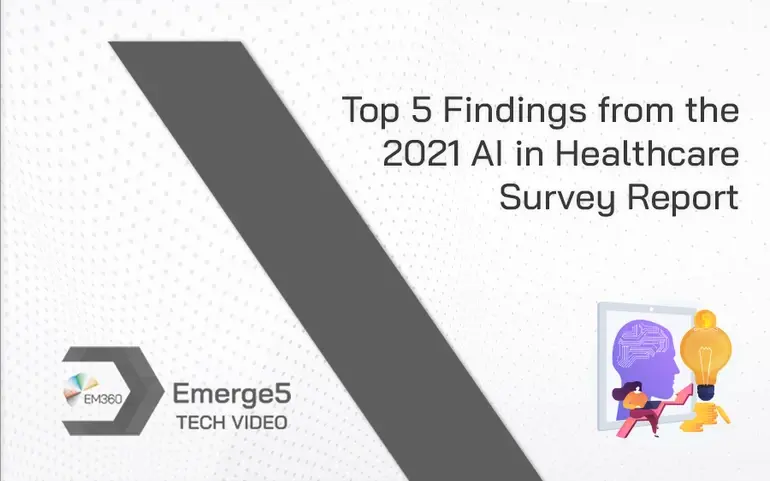
As artificial intelligence becomes more of a fundamental in each industry, experts in each field assess the value it can bring to their organisation. With increasing demand and strain on the health industry, AI in healthcare is proving to be essential. In this episode of Emerge5, we look into the top 5 findings from the 2021 AI in Healthcare Survey Report by John Snow Labs and Gradient Flow.
Users of AI Technologies
When asked about the intended users for AI tools and technologies, over half of respondents identified clinicians among their target users. This indicates that AI is being used by people tasked with delivering healthcare services. A vast majority of respondents from mature organisations with extensive AI experience responded that clinicians and healthcare providers are users of their AI technologies. Over half of respondents (59%) from mature organisations indicated that patients are also users of their AI technologies.
Enjoyed this article? Check out the YouTube Channel for the latest tips in enterprise tech.
Validating AI and Machine Learning Models
Healthcare is a heavily regulated industry with tight controls and procedures in place for working with data and models. In fact, healthcare has been at the forefront in many areas that are now collectively referred to as Responsible AI. Healthcare, biotech and pharmaceutical industries have long had regulations governing data privacy as well as guidelines for deploying AI and machine learning.
The majority of companies with experience deploying AI models to production wisely choose to validate models using their own data and monitoring tools, rather than relying on evaluation from third parties or software vendors. In contrast, companies still in the early stages of exploring AI are more open to evaluation metrics provided by software vendors.
Foundational Technologies
Companies that want to build AI applications need to have foundational technologies in place. This includes technologies for acquiring data, transporting and transforming data, storing data and tools for applying analytics and machine learning. When asked what technologies they plan to have in place by the end of 2021, almost half of respondents cited data integration. About one-third cited natural language processing (NLP) and business intelligence (BI) among the technologies they are currently using or plan to use by the end of the year. Half of technical leaders are using (or soon will be using) technologies for data integration, NLP, business intelligence, and data warehousing.
Software for Building AI Solutions
When asked what types of software respondents are using to build their AI applications, the most popular selections were open source software at 53% and public cloud providers at 42%. Projecting one to two years ahead, the most popular selections remained open source software and public cloud providers. However, many more respondents indicated openness to using both commercial software and commercial SaaS.
Key Criteria Used to Evaluate Solutions, Tools, and Partners
The survey revealed that 44% of technical leaders considered no-data sharing with software vendors to be very important while also placing high importance on the ability to train their own models (42%), scalability to large datasets (43%) and state-of-the art accuracy (48%).
Futhermore, leaders are looking into locally installed software libraries or SaaS. 40% of technical leaders value healthcare- specific models and algorithms and having a production-ready codebase which an additional 41% value expertise in healthcare data engineering, integration and compliance.

